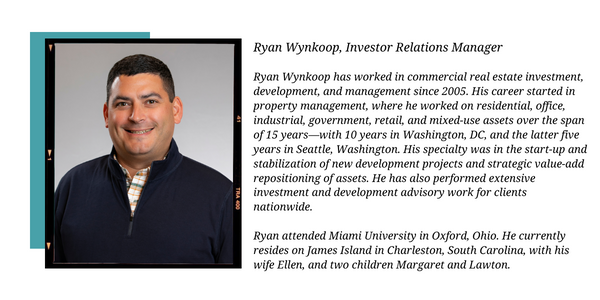April 18, 2023
By: Ryan Wynkoop, Investor Relations Manager
A common theme in the questions we hear from new and existing investors alike concerns the key elements of real estate syndications that differentiate the large field of sponsors that exist in the marketplace. We have heard horror stories from a number of our investors over the years about deals they invested in that went sideways (at best)—and while we do not track the industry as a whole, we know there are attributes of real estate investors and sponsors of deals we feel are critical to success. We wanted to share those with you here.
Track Record
Every company needs to start somewhere, some sponsors are more established than others—but it is critical to know a real estate syndication sponsor’s track record to see how they have performed in deals over time. This should demonstrate consistency in performance, and for the deals that are low performers, you can dig in and identify lessons learned from that specific real estate syndication. At Ashcroft, we have a consistent track record that we are proud of. We started in 2015 and have exited 26 deals to date with an average return of 25.6% to the investor. We currently have 37 other deals going through our value-add process.
Business Plan/Strategy to Market
Most real estate sponsors have many different asset classes they are invested in, and within those asset classes they also may have different strategies to market. An investor would want to understand the business plan and broader strategy for a specific asset to know it was a deal they were comfortable investing in. At Ashcroft we have an extremely detailed market strategy, specifically, we only pursue multifamily apartment deals over 200 units in top-tier Sunbelt submarkets. Once acquired, we execute a value-add strategy on those assets, making strategic capital improvements over a three-to-five-year hold period.
Vertical Integration
There are large and small real estate sponsors in the open market, and it’s imperative to understand how they execute their business plan and overall strategy. Some real estate syndications rely on outside sponsors or partners to maintain the day-to-day operations of their deals. Larger and more established real estate sponsors tend to have in-house operational capabilities in the way of property and construction management personnel. When vetting groups, investors should seek to understand how they are structured and what level of risk you are comfortable with as an investor. At Ashcroft we have in-house property and construction management through our subsidiary Birchstone Residential, which is headquartered in Dallas, Texas, and has personnel in the field at every one of our properties. This vertical integration is imperative to our ability to execute our business plan and overall strategy in a timely and seamless manner.
Communication
A common theme I hear among some of our investors is that they have invested with groups in the past and received little to no communication on performance and operations throughout the course of the deal. It’s easy to imagine this does not instill confidence and transparency in the investor and is obviously not a desirable situation to have with someone holding your invested capital. At Ashcroft we believe in maintaining ongoing and consistent communication with our investors. This comes in the way of monthly reports when distributions are issued, and we also have a full Investor Relations and Investor Services team that is always accessible.
Retention Rate/Repeat Investment
A great metric to understand how satisfied clients are with a real estate sponsor is their retention rate or repeat investment rate. If a real estate investor tracks this and is willing to disclose it, this data point can indicate how pleased investors have been to continue to invest their capital in deal after deal with a real estate investor. For example, 65% of the AVAF2 investors were repeat Ashcroft investors. We feel this is one of our strongest statistics of the confidence our investors have in us and our overall performance.
Financial Projections/Disclosure of Fees
Last, investors should consider what type of projections are being presented: Gross or Net Projections. Unlike gross projections that do not disclose all fees to the investor, net projections consider these fees. We highly recommend that anyone vetting real estate investment opportunities make sure to look out for anything that is not net projections and inclusive of all fees. At Ashcroft we believe in transparency and present investors with an accurate picture of what they can expect in the way of returns, and our fees are included in those projections.
Due diligence is a crucial part of the investment process. When investors conduct research and ask questions, it makes it easier to make an informed decision. Your interactions with the syndicator and team should make you feel comfortable and confident about investing your money. Although this is not an all-inclusive list of the required elements for a real estate sponsor that an investor should consider, it is a good starting point to better navigate the market.
For information on our current fund, The Ashcroft Value-Add Fund III, visit https://info.ashcroftcapital.com/fund or schedule a call with our Investor Relations Team at investorrelations@ashcroftcapital.com.



